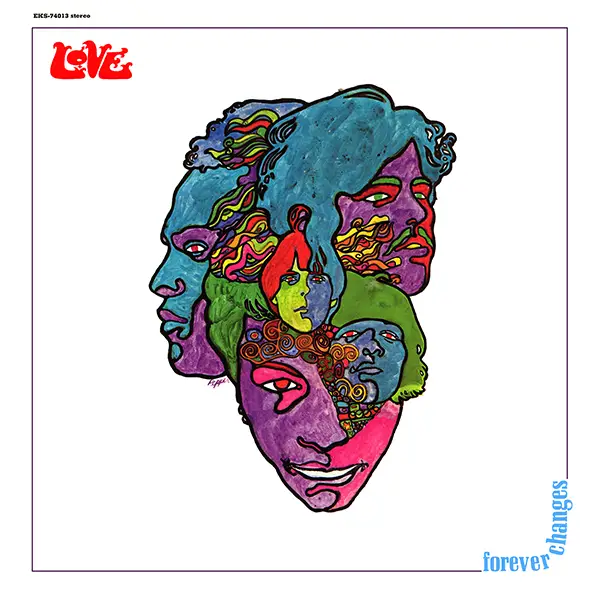#68 Forever Changes by Love
The 100 Greatest Albums of All Time

- 2025 Album Rank
- 68
- 2011 Album Rank
- 47
- Total Points
- 898
- Year Released
- 1967
- Billboard 200 Chart Peak
- 154
- Weeks at #1
- N/A
- RIAA Sales Certification
- N/A (Sold under 500,00 copies)
- Buy Album
- Apple Music Amazon
Forever Changes Album Details
Released in November 1967, Forever Changes by the Los Angeles-based band Love is a haunting, orchestral, and enigmatic masterpiece. Though it received only modest commercial success upon release, the album has since become widely regarded as one of the greatest and most unique records of the 1960s. Its fusion of folk rock, baroque pop, and subtle psychedelia, combined with poetic and often unsettling lyrics, sets it apart as a singular vision of late-1960s disillusionment.
Led by Arthur Lee, Love had become the first rock band signed to Elektra Records and were central figures in the L.A. music scene. But by the time of Forever Changes, the band was fracturing due to drug issues and personal tensions. As a result, much of the album was recorded with session musicians from the Wrecking Crew, though the band eventually regrouped to complete it. The album's acoustic textures, delicate horns and strings, and apocalyptic lyricism give it an otherworldly sense of beauty and dread.
Interesting Facts about Forever Changes
- The title Forever Changes was reportedly inspired by a conversation Arthur Lee had with his girlfriend. When she said "forever," he replied, "Yeah, well, forever changes."
- Early in the sessions, Lee fired most of the band after they failed to produce satisfactory takes. Session musicians Don Randi, Billy Strange, Carol Kaye, and Hal Blaine (of the Wrecking Crew) recorded the basic tracks for "Andmoreagain" and "The Daily Planet."
- The band was allowed to return after Lee and producer Bruce Botnick were impressed with their redoubled commitment. Bryan MacLean's contributions, such as "Alone Again Or," are among the album's highlights.
- "Alone Again Or" originally had the working title "Alone Again." The "Or" was added after Arthur Lee misheard the song title and liked the ambiguity it introduced.
- The mariachi-style brass on "Alone Again Or" was an unconventional choice that became one of the album's most iconic features. The trumpet solo was performed by Roy Caton.
- Despite its West Coast roots, the album's mood is paranoid and introspective. Lee believed he was going to die soon, an anxiety that shaped the album's apocalyptic tone.
- The orchestral arrangements were written by David Angel and are integral to the album's unique sound. Angel worked closely with Lee and Botnick to keep the strings subtle and atmospheric.
- One of the most haunting tracks, "The Red Telephone," reflects on death, mental illness, and racial tension. Its refrain "they're locking them up today, they're throwing away the key" is delivered with eerie calm.
- Arthur Lee was the first African American artist to lead a major integrated rock band to critical acclaim, though his racial identity was often ignored or downplayed at the time.
- There are alternate versions and rehearsals of several tracks available on deluxe editions, including early takes of "A House Is Not a Motel" with heavier electric guitar parts.
- The album barely charted on initial release but gained traction through critical acclaim and cult admiration in the UK, where Love enjoyed a larger following than in the US.
- The 2003 remastered edition included outtakes and alternate mixes. The acoustic backing and vocal phrasing on these versions reveal how carefully Lee constructed the album's tone and pacing.
- Arthur Lee performed Forever Changes live in its entirety for the first time in 2003, backed by the Los Angeles ensemble Baby Lemonade and a full string and horn section. It was a critical triumph and helped cement the album's legacy.
- The album was inducted into the Grammy Hall of Fame in 2008 for its cultural and historical significance.
Forever Changes Track List
- Alone Again Or
- A House Is Not a Motel
- Andmoreagain
- the Daily Planet
- Old Man
- The Red Telephone
- Maybe the People Would Be the times or Between Clark and Hilldale
- Live and Let Live
- The Good Humor Man He Sees Everything Like This
- Bummer in the Summer
- You Set the Scene
